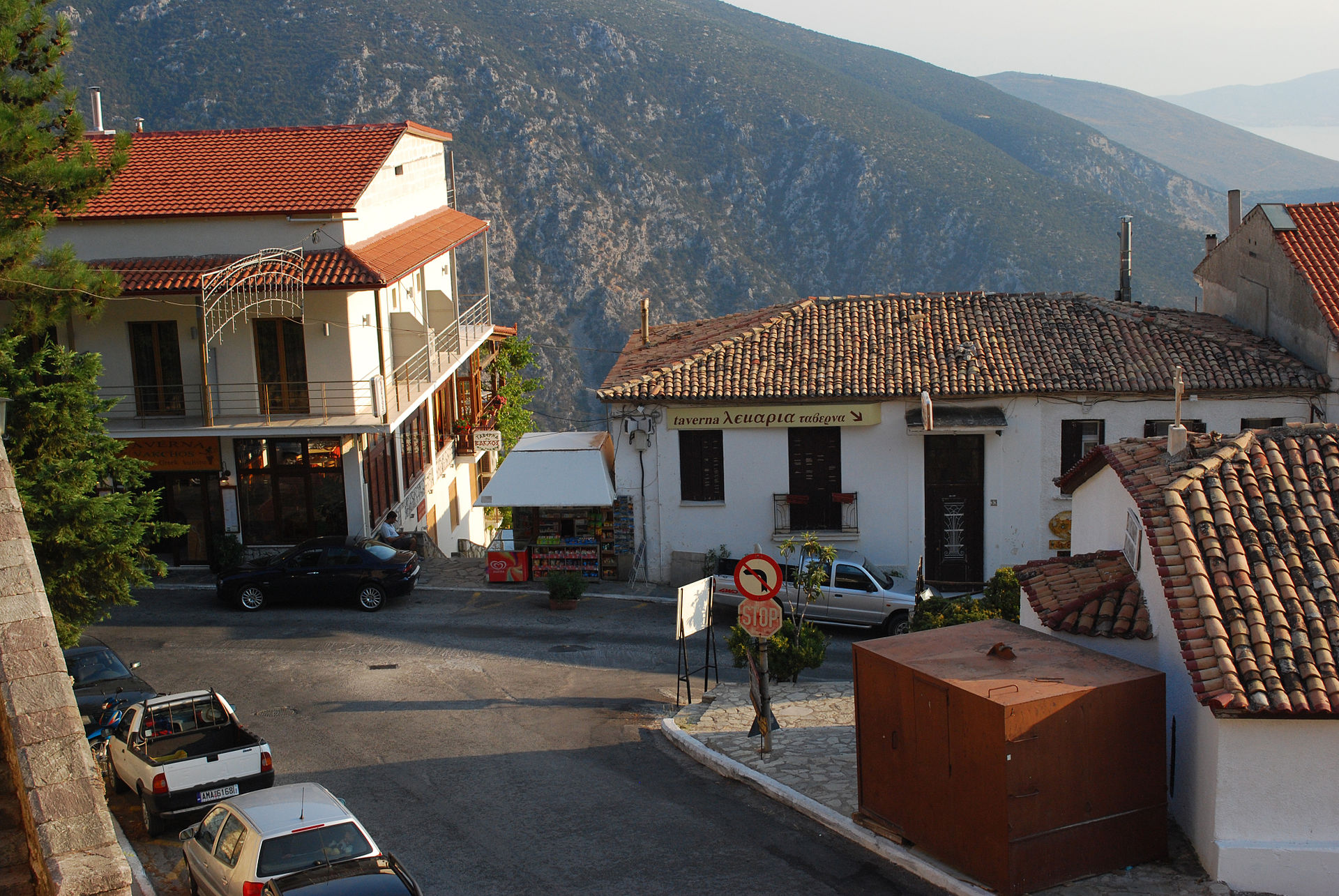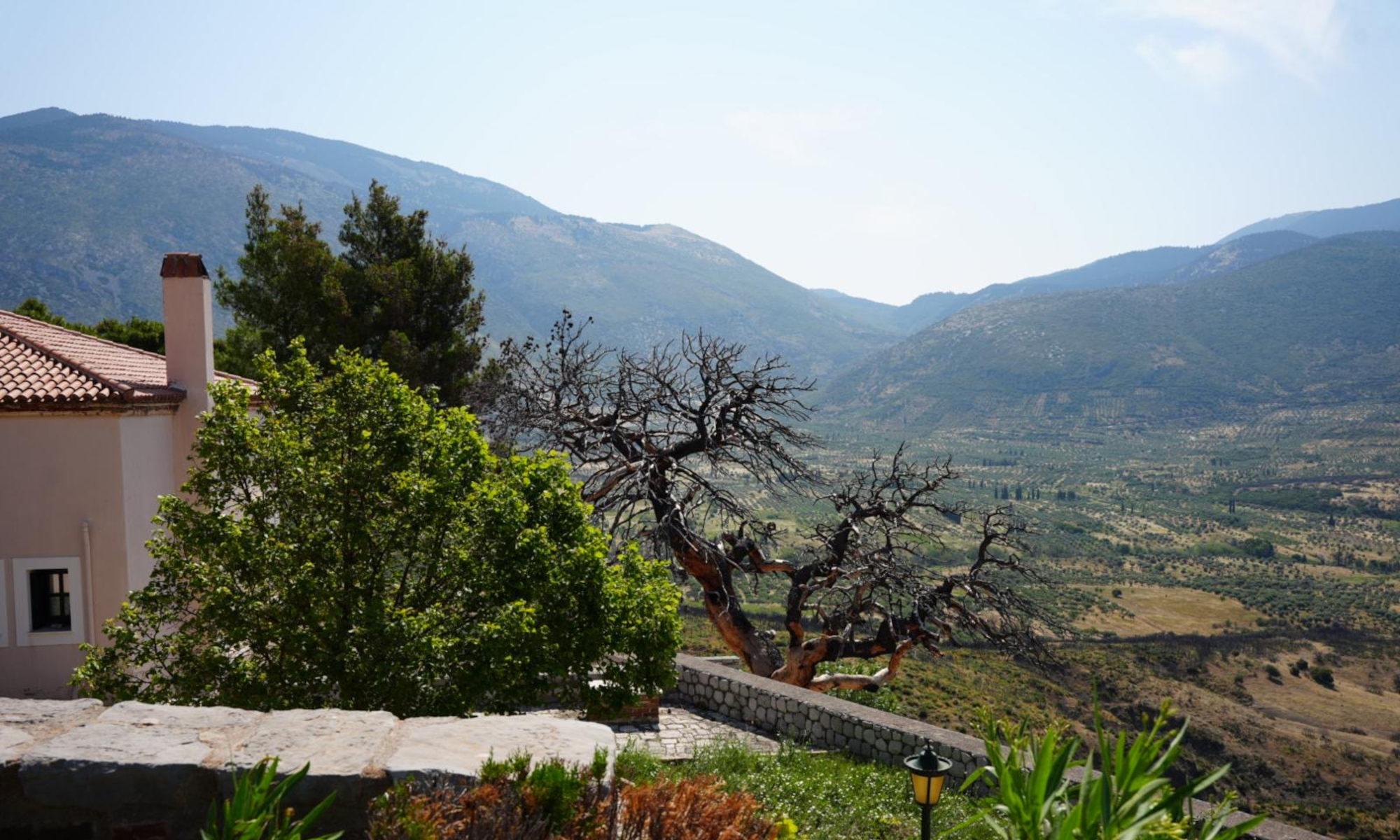By Valerio Castellini

At the entrance to modern Delphi, the structure that once hosted the Hotel Apollon sits quiet and empty. Its balconies are rusting, the paint on its facade faded to a dull beige. Shuttered windows overlook an almost deserted square. A small, sun-bleached sign still bears the name of the town’s first tourist establishment. Now it’s a ghost of an ambitious past—a mirror, perhaps, of how Delphi’s present struggles to live up to its legacy. Today, Delphi feels like a stage after the audience has left.
Today, while the ruins of the ancient Oracle still draw thousands, the modern town of Delphi is quietly crumbling—its fate sealed by the economics of a changing tourism industry.
Second only to the Acropolis, Delphi has long been a cornerstone of Greece’s cultural heritage circuit. Large tourist inflow began in the second half of the 20th century, when Greece was under the dictatorial rule of the Regime of the Colonels.
Delphi was one of the sites identified by the Xenia project, a program sponsored by the regime that promoted the construction of touristic infrastructure in selected historical locations that would uphold Greece’s image building on its glorious ancient past. It was pure propaganda, but it is representative of the importance of Delphi in antiquity, when it served as the cultural and religious capital for the Hellenic world (and beyond).
Perched on the slopes of Mount Parnassus and overlooking the stunning Pleistos River Valley, it has ever since offered generations of visitors not only the weight of history, but the promise of immersion. In recent years, that promise is fading.
This is a result of a wider crisis that had been brought up in our conversation with Giorgos Lialios, a journalist at Kathimerini who covers overdevelopment and tourism. “There is an issue with the quality of tourism,” he said. “The tourism industry is not developing—it’s just growing.”
Lialios points to the rise of short-term rentals and low-cost flights, which have made Greece more accessible than ever—but at a cost. Tourists can now easily and affordably spend their vacations here, but they often opt for more superficial activities that in most cases do not touch, or only hastily, cultural destinations.
This is especially harmful for the site of Delphi, which is located off the beaten track for most itineraries. In order to visit Delphi, one must plan specifically in order to include it. It is a three hour (often more) commute from Athens or any other major port of arrival, and clearly, unless vehemently passionate, many will happily disregard it.
This is reflected in data. According to the Hellenic Statistical Authority, Delphi saw a 41% drop in visitors from January to November 2024 compared to the same period the year before—plummeting from over 460,000 to just 284,000.
Many factors may be at play, but the numbers are too stark to be dismissed.
This has a huge toll on the adjacent town. If overall visitors have decreased, the number of them having an overnight stay is even lower. “Most people come as a day trip from Athens,” said Sophia Theona, a longtime guide at the ancient site. “Not many people spend the night.”
Today, the streets are lined with hotels and souvenir shops—proof of an infrastructure built for crowds that rarely come. Most storefronts are either shuttered or open for only a few hours a day. It’s strangely difficult to find a place to buy groceries, not even a mini-market in sight. The few shops that remain open sell the same plaster statues and fridge magnets found in Plaka or Monastiraki.
“Businesses are shutting down—they just don’t have enough customers to stay open,” added Sophia.
From behind the counter of an ice cream shop on Delphi’s main street—the only place open in the late afternoon of a Tuesday—36-year-old Iordanis sees the same pattern. “In the spring we get school groups, but they come and go. They might take a walk in town, but they don’t stay.”
A quick informal experiment reinforces these theories. On popular platforms such as Booking.com and Airbnb, the vast majority of properties are still vacant for the coming peak season—most of them being available for same-day bookings.
For a town built around the expectation of overnight guests, the loss of that rhythm is minatory.
Delphi seems to have lost its individuality, eroded by the very industry it hoped would sustain it. A town that sold its soul for tourism, and that is now facing the consequences of its decline.
It is not necessarily the result of bad choices. Delphi is rather the victim of a change in demand that it has not been able to—and probably would not be—accommodate. The hordes of tourists that arrive on cruise ships daily in Mykonos or Santorini would not find in Delphi what they are looking for. They will rather enjoy an ‘Instagrammable’ spot, or a restaurant disguised as traditional. Most now prefer performative tourism, without any significance or genuine learning behind it.
Tourists now spend less and stay shorter. Just the time to get some good pictures in and tick Greece off their wish-list.
Good for visitors, maybe. Less so for Greece.
